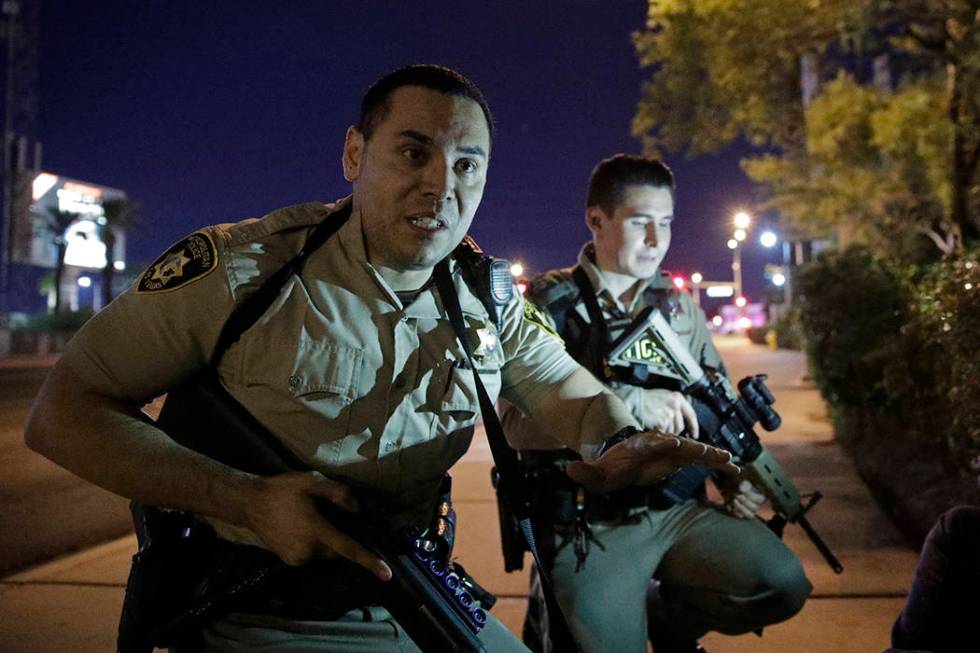Feds laud Las Vegas police for mental health program

The Department of Justice praised the efforts of Las Vegas police to address mental health issues among officers, particularly after the Oct. 1, 2017, shooting, in a report released Wednesday to Congress.
Those interviewed within the Metropolitan Police Department said its comprehensive Police Employee Assistance Program, or PEAP, prepared officers for the severe emotional effect the mass shooting on the Strip would have, according to a case study of the program.
The report lauded Metro’s program, one of the oldest of its kind in the U.S., saying its peer-to-peer counseling services have “long been the standard” and are ingrained in the department’s culture.
“So often trauma response comes in the wake of a critical incident, leaving gaps as the practices catch up to the need. The LVMPD was not in that position in October 2017,” the report said.
“The LVMPD spent decades perfecting their process so that when the most harrowing calls came, they had the tools, systems, and best responses in place with deployment as their primary focus.”
PEAP began in 1984, at a time when discussing mental health among law enforcement was taboo, according to the report, authored by the Justice Department’s Office of Community Oriented Policing Services.
Since then, the program has grown and provides a bevy of resources to Metro employees, such as referral services for personal or work concerns, responses to the scenes of police shootings to assist involved officers and yearly health assessments.
They also train staff to recognize signs of stress and trauma, then find a personalized approach to address their issues.
“I think we’re very unique in that we started this so long ago,” program director Annette Mullin said Wednesday.
After Oct. 1, PEAP stood the test by sending its peer counselors to the scene, the hospitals and stations to lend an ear to staff and their families in the immediate aftermath of the shooting, the report said. Metro honored 10 program representatives for their efforts at a January awards ceremony.
The department relies on its chaplains embedded within Metro’s area commands to meet the spiritual needs of staff, and they were particularly leaned upon after the shooting, the report said.
The program also networked with other local first responder peer groups to help staff bond and process through their similar experiences, Mullin said.
“Now we know we can rely on each other,” she said.
Metro was one of 10 departments studied to understand how they take care of their own and how wellness practices could be replicated elsewhere.
Among them was the Los Angeles County Sheriff’s Department, commended as a model for mental health and wellness programs by employing law enforcement psychologists and providing regular access to trained peers and professionals.
A federal law enacted in January 2018 tasked the Office of Community Oriented Policing Services with performing case studies of existing wellness programs along with making recommendations to Congress on how best to protect law enforcement’s well-being.
The office presented its findings Wednesday in two separate reports to Congress, a DOJ release said.
The report also praised the program’s professional diversity — officers, corrections officers and a civilian — to best meet a variety of needs within the department, as well as Sheriff Joe Lombardo’s advocacy of the program. It’s easier to trust a program’s resources when the program employees are “someone who shares your world,” Mullin said.
“We really represent who we actually serve,” she said.
A decadeslong career in law enforcement can take its toll on someone, she said. And while once viewed as a sign of weakness, seeking help when needed is increasingly recognized as vital to law enforcement duties, she said.
“I’m just proud that at this point policing as a whole is taking a look at mental health and wellness,” Mullin said.
Contact Mike Shoro at mshoro@reviewjournal.com or 702-387-5290. Follow @mike_shoro on Twitter.